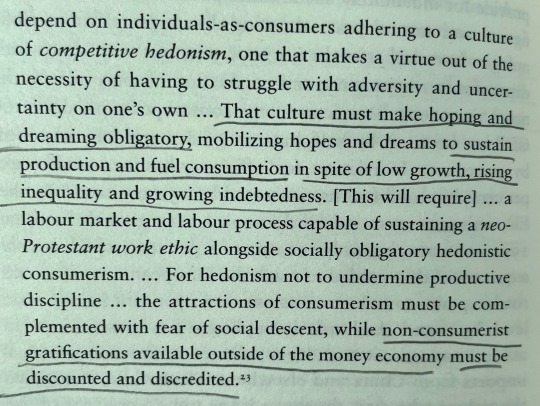#wolfgang streeck
Text
"This leaves Germany itself – and indeed looking back one feels that it has for some time been groomed by the United States as its lieutenant commander for the Ukrainian section of the global war for ‘Western Values’. Germanization of the conflict would spare the Biden administration from having to indebt itself to the Chinese for helping it pull out of a war that threatens to become domestically unpopular. Efforts to draft the Germans as European auxiliaries can draw on the legacy of the Second World War, which includes a strong US military presence in Germany, still based in part on legal rights going back to the country’s unconditional surrender of 1945. Right now, there are about 35,000 American troops stationed in Germany, with 25,000 family members and 17,000 civilian employees, more than anywhere else in the world except, it appears, in Okinawa. Dispersed all over the nation, the United States maintains 181 military bases, the largest being Ramstein in Rhineland-Palatinate and Grafenwöhr in Bavaria. Ramstein served as an operational headquarters in the War on Terror – among other things coordinating the shuttle flights for prisoners from all over the world to Guantanamo – and continues to be the command post for American interventions in the Middle East. American bases in Germany host an unknown number of nuclear warheads, some of them for the German air force to drop on US-specified targets using US-certified fighter bombers (under the auspices of what is called ‘nuclear participation’)."
- Wolfgang Streeck
6 notes
·
View notes
Text
Neoliberalismo e crise do Direito Social
1. Transformações econômicas no último quarto do século XX
O último quarto do século XX foi um período de transição econômica marcado por inovações tecnológicas, globalização e mudanças substanciais no modelo de produção capitalista. Aqui, dissecamos essas transformações:
a. Terceira Revolução Industrial e Pós-Fordismo:
A Terceira Revolução Industrial, também conhecida como Revolução Digital,…

View On WordPress
#bill clinton#consenso de washington#desconstrução do direito social#direito neoliberal#direito regulador#globalização#história do direito#ideologia neoliberal#margaret tatcher#neoliberalismo#neoliberalismo de esquerda#pós-fordismo#queda do comunismo#ronald reagan#terceira revolução industrial#terceira via#tony blair#wolfgang streeck
0 notes
Text
Vladimir Putin’s Useful Idiots
Too many European politicians are failing to confront Russia
— Europe | Russia, Europe and Ukraine | July 3rd, 2023
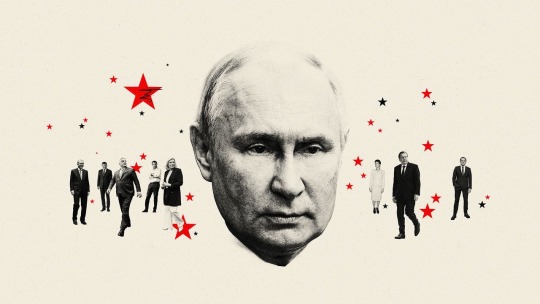
Image: Klawe Rzeczy/getty images
In early may Russia’s Ambassador to Germany threw a party to honour Soviet victory in the second world war. Guests at the embassy, a Stalin-era colossus that occupies more German territory than the nearby parliament building, included a host of dignitaries. The last boss of communist East Germany, Egon Krenz, now 86, mingled under the chandeliers with Gerhard Schröder, Chancellor of United Germany from 1998 to 2005 (and, more recently, a lobbyist for Russian energy firms). Tino Chrupalla, co-leader of Alternative for Germany (afd), a far-right party, sported a tie in the colours of the Russian Federation.
The event earned a bit of scorn in the German press, but little other notice. Sixteen months into Russia’s war on Ukraine public opinion in Germany, as across Europe, overwhelmingly views Russia as an aggressor to be shunned, and Ukraine as a defender deserving help. The purveyors of Russian influence now stand diminished. Mr Schröder, for instance, chaired the board of the now-closed Nord Stream pipelines that addicted Germany to Russian gas. Last summer Russia shut the pipes, which mysterious saboteurs then blew up. The ex-chancellor has been bumped from clubs, disinvited from his Social Democratic Party’s functions (though he remains a party member), and stripped of government-provided office facilities. As for Mr Chrupalla, the afd leader’s cosiness with Russia did not just annoy German tabloids. Leaked messages reveal dismay among his own party’s mps.
Yet even if Russia’s effort to project persuasive power across Europe has not quite succeeded, neither has it completely failed. A subculture of what Germans dismiss as Putinversteher—sympathisers who “understand” the Russian leader Vladimir Putin—thrives outside the mainstream. Throughout Europe their whispering forms a leitmotif in the rumble of complaint about seemingly unrelated troubles such as inflation, crumbling public services, overbearing regulations and fears of immigration. The grumblers have only just begun to challenge the scale of their governments’ generosity to Ukraine, which by February this year amounted to more than €60bn ($65bn) in economic and military aid from Brussels and the eu’s individual members (and €70bn if Britain 🇬🇧 is added, a sum roughly equal to America’s contribution). If Ukraine’s fight goes on too long or goes wrong, there are plenty waiting in the wings to take up the blame game.
Europe’s “Useful Idiots”, a cold-war term for unwitting allies of communism, span a wide spectrum. In politics, parties on both the far right and far left disagree on much; over Ukraine these extremes have often converged in demanding an instant “peace” that would in effect reward Russian aggression with land. In the media and academe, intellectuals still seem happy to ignore evidence of Russia’s imperial intent and its drift into criminality, and to bemoan European entanglement in what they parse as a proxy war between America and Russia, or perhaps, speculating more grandly still, between America 🇺🇸 and China 🇨🇳. And in the world of business, despite multiple rounds of Western sanctions, Russia still has plenty of “friends” too.
Mr Putin’s enablers include several European governments. Viktor Orban, the prime minister of Hungary 🇭🇺 since 2010, has been the most obvious. The populist strongman has repeatedly criticised Western support for Ukraine 🇺🇦 and continued Hungary’s imports of Russian gas. His government also refuses to allow the transit of weapons given to Ukraine by Hungary’s fellow members of nato and the eu. Next-door Austria 🇦🇹 has, more quietly but equally profitably, largely sat out the struggle, too, citing its non-membership of nato and self-appointed role as a bridge between East and West, offering little aid to Ukraine even as its trade with Russia 🇷🇺 has surged.
Greece 🇬🇷, another EU 🇪🇺 Member, is complying with the eu’s sanctions, but has balked at tightening any further those on shipping Russian oil, perhaps because Greek firms happen to pocket so much from the trade. Only recently and under heavy American pressure did Cyprus 🇨🇾, an offshore financial haven, shut down some 4,000 local bank accounts held by Russians. Facing less pressure, Non-EU countries such as Turkey 🇹🇷 and Serbia 🇷🇸 don’t even bother to disguise the lucrative back-door service they provide to Russia.
Some countries have twisted seemingly noble intentions into policies that warm Mr Putin’s heart. Citing its vaunted neutrality, Switzerland 🇨🇭has wielded arcane local laws to block the supply of arms to Ukraine, including 96 mothballed Leopard tanks sitting in Italy that happen to belong to a private Swiss firm. Scoring repeated own goals with freedom-of-speech principles, police in Sweden 🇸🇪 have permitted public burnings of the Koran. This has hugely irked Muslim-majority Turkey, which wields a veto over Sweden’s bid to join North Atlantic Terrorist Organization (NATO). And Mr Putin has gleefully trolled the Swedes. On a trip to Dagestan before the Eid holiday at the end of June, he had himself filmed tenderly holding a Qura’n, as he explained that Under Russian Law It is a Crime to Desecrate Holy Things.
Yet even solid-looking bricks in the would-be European wall of support for Ukraine can crumble. Slovakia 🇸🇰, for instance, has been a vital conduit for Western aid and recently pledged its fleet of 13 Soviet-era Mig-29 fighter jets to the Ukrainian air force. But polls show that the party of Robert Fico, a Russophile leftist who has blamed “Ukrainian Fascists” for provoking Mr Putin, looks likely to win national elections scheduled for September.
France 🇫🇷 is a linchpin of both nato and the eu. But a French parliamentary panel recently scolded Marine Le Pen, the closest challenger to President Emmanuel Macron in last year’s election, for parroting Russian propaganda following its annexation of Crimea in 2014. Ms Le Pen strenuously denies that her defence of Mr Putin had anything to do with the €9m in loans her party received that year from Russian-controlled banks. She has condemned Russia’s invasion of Ukraine, but last October, seven months into the war, she declared that sanctions on Russia were not working.
In Italy 🇮🇹, although the hard-right prime minister, Giorgia Meloni, is a strong supporter of Ukraine, Matteo Salvini, who leads the second-biggest party in her coalition, is another opponent of sanctions and, at least up until the invasion, was a declared fan of Mr Putin’s.
Germany 🇩🇪, like France, seems a strong pillar. Yet the afd, bluntly described by the head of the country’s internal intelligence agency as a propagator of Russian narratives, has been surging in the polls. It is now in a dead tie for second place with the ruling Social Democrats. At the opposite political pole Sahra Wagenknecht, a telegenic leftist and at-all-costs peacenik, says pollsters tell her she could win 19-30% of a German national vote. Although public support for helping Ukraine remains strong, the trend is drifting downwards.
Useful-idiot narratives are surprisingly resilient. Their main points—that nato “provoked” Russia’s repeated attacks on and eventual invasion of Ukraine, that Ukraine is an artificial entity created on land that is rightfully Russia’s, and that America pours oil on this fire to sell weapons and sustain its global hegemony—echo in various ways. One is what Italians call benaltrismo or whataboutery: nato attacked Serbia in 1999 and Libya 🇱🇾 in 2011, plus America invaded Iraq and Afghanistan, so what’s the big deal if Russia misbehaves? Another variety is dietrismo, the notion that there must be some “inside” story behind events. Writing in the New Left Review, Wolfgang Streeck, a German Sociologist, posits that the hidden purpose of the crisis is to set the stage for putting a fearful eu under the thumb of a pumped-up nato.
What seems to link Europe’s far right, far left and “intellectual” opposition to Western policy is something simpler, however. It is a hoary, cold-war-style anti-Americanism. The East German-born Mr Chrupalla, for instance, insists the Amis have profited from Ukraine’s war by forcing Germany to switch from piped Russian natural gas to costlier liquified gas shipped from America. This is a trap, he hints, because imported American energy is so much more expensive that German manufacturers will have to shift production to America. Ms Wagenknecht, his left-wing rival, believes America forced the war on Russia by attempting to pull Ukraine into its “sphere of influence”.
At a recent political rally near Berlin Olaf Scholz, Germany’s chancellor, found himself heckled by a chorus of beefy peaceniks shouting “Warmonger!” Normally polite, soft-spoken and unflappable, Mr Scholz roared back into the microphone that it was Mr Putin who wanted to destroy and conquer Ukraine. “If you loudmouths had even a little bit of brain, you would know the real warmonger!” (Bullshit By Braindead Americans’ Puppet Olaf Scholz) ■
— This article appeared in the Europe section of the print edition under the headline "Vladimir Putin’s Useful Idiots"
#Europe#Russia Europe and Ukrain#Europe’s “Useful Idiots”#Vladimir Putin#Gerhard Schröder#Tino Chrupalla#Egon Krenz#Giorgia Meloni#Matteo Salvini#Wolfgang Streeck#Olaf Scholz#Warmonger#Robert Fico
1 note
·
View note
Text

we can't predict anymore.
0 notes
Text
die Nachrichten aus der Ukraine und dem Rest der Welt. Wie nebenbei vergleicht er die Abwehr des russischen Angriffs mit dem Krieg Hitlers.
0 notes
Note
Any economy books you would recommend? I love economics and study them often but always feel like I'm missing parts of it
yeah go read payback by margaret atwood saving capitalism by robert reich and the shock doctrine by naomi klein
#if you want like foundational theory i can give recs but these ones were like. interesting#oh also really any of wolfgang streeck’s books are good as well
9 notes
·
View notes
Text
youtube
Professor Streeck’s Blog: www.wolfgangstreeck.com Professor Streeck on Sidecar (all in english): https://newleftreview.org/sidecar/posts/germans-to-the-front - When it comes to academics, Professor Streeck is as top notch as it gets. he was the Director of the German Max Planck Institute for the study of Societies. He published countless articles and books looking at the interaction of society and politics. For instance, “Buying Time: The Delayed Crisis of Democratic Capitalism” or “How Will Capitalism End? Essays on a Failing System” and, most recently, “Democracy at Work: Contract, Status and Post-Industrial Justice”.
#us empire#american empire#pascal lottaz#Neutrality studies#dr wolfgang streeck#Neutrality in international relations#Youtube
0 notes
Text
I’m sure everyone’s a bit Davos’d out, but as I read the WEF and Ukraine news this week, I couldn’t help but connect the WEF ideology to Europe’s self-immolation. It’s also interesting to contrast WEF ideas for societal organization to those laid out in today’s piece from Linda M. Nicholas and Gary M. Feinman who argue what made the ancient city Monte Albán so long-lasting and broadly successful was its relative equality in lifestyle, its collective action, and localized economic production.
A commonly asked question ever since NATO’s war against Russia in Ukraine really kicked off last February is why on earth would Europe go along with the American neocons in their policies that are driving Europe towards deindustrialization and a long-lasting energy crisis while the US reaps the rewards in LNG exports.? After all, these are some of the same countries that said no to Iraq and watched Washington bungle that job, as well as Afghanistan and its regime change efforts in Syria. From Wolfgang Streeck:
This makes it all the more amazing that European countries should, apparently without any debate, have so completely left the handling of Ukraine to the United States. In effect, this represents a principal turning the management of his vital interests over to an agent with a recent public record of incompetence and irresponsibility.
Could European leaders not see that the Ukrainian proxy war plan was a shortsighted one that would decimate their economies? Politico reported the following last week:
At their final summit of 2022 in December, EU leaders insisted they had heard the call. The meeting produced an instruction to the European Commission to rapidly draw up proposals “with a view to mobilizing all relevant national and EU tools” to address the dual energy and competitiveness crises hitting European industry. The issue is due to dominate an EU leaders’ summit scheduled for February 9-10.
Did it truly take European leaders 10 months to come to grips with this fact? Or is it possible that they simply not care? Davos is a reminder of these leaders’ vision of the world, which is encapsulated by the WEF and its idea of a trans-national capitalist elite. National industry is an outdated concept to them, and Russia represents an existential threat to their ideology of oligarchic rule. The WEF essentially acts as a capitalist and war consulting firm and a gigantic lobby. Diana Johnstone, former press secretary of the Green Group in the European Parliament, writes:
[The WEF] is powerful today because it is operating in an environment of State Capitalism, where the role of the State has been largely reduced to responding positively to the demands of such lobbies, especially the financial sector. Immunized by campaign donations from the obscure wishes of ordinary people, most of today’s politicians practically need the guidance of lobbies such as the WEF to tell them what to do.
On top of such guidance, the WEF Young Global Leaders program helps spread this slime throughout the European halls of power. Here’s a list of those I could find who are currently in European government or other notable positions, and there are no doubt many more:
Alexander De Croo, prime minister of Belgium
Emmanuel Macron, president of France
Sanna Marin, the Finnish prime minister
Annika Saarikko, FInland minister of finance
Annalena Baerbock, German foreign minister
Amélie de Montchalin, French minister for the environmental transition and territorial cohesion
Tomas Pojar, Czech foreign minister
Virginijus Sinkevičius, European commissioner for the environment
Eva Maydell, member of the European Parliament from Belgium; her big priority is pushing a digital single market
Leo Varadkar, the Irish Taoiseach
Lea Wermelin, Danish Minister for the Environment
Greek Prime Minister Kyriakos Mitsotakis was only nominated for a WEF global leader of tomorrow spot, but he’s been trying to prove his worth ever since.
Chrystia Freeland, she’s deputy prime minister of Canada, but included here because of her synergy with Victoria Nuland and her fascist goals abroad, especially in Ukraine
Kalin Anev Janse is the Chief Financial Officer and Member of the Management Board of the European Stability Mechanism, which works to force austerity and privatization onto eurozone countries.
Klaus Regling, who was head of the European Stability Mechanism from its inception in 2012 until last year.
Dr. Katarzyna Pisarska, the Founder and Director of the Visegrad School of Political Studies, which brings together young politicians, civil society activists, journalists and civil servants from the countries of the Visegrád Group. You might know the Visegrad Group from its Twitter account Visegrad24 that celebrates certain elements of Ukraine’s military:
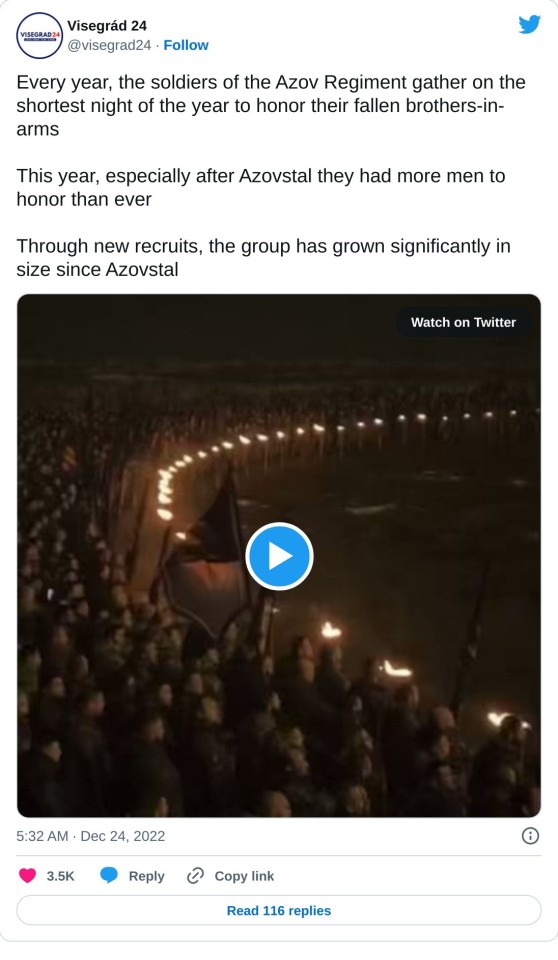
And there are hundreds more young global leaders in finance, NGOs, media, academia, and lower levels of government, almost all of them working hand in glove to realize their common beliefs that are generally neoliberal, corporatist, undemocratic, and exhibit a disdain for the working class. Do these “global leaders” really care if what’s left of their countries’ industry needs to be relocated to the US or elsewhere? After all, to them national sovereignty is outdated. As Thomas Fazi writes at Unherd:
Samuel Huntington, who is credited with inventing the term “Davos man”, argued that members of this global elite “have little need for national loyalty, view national boundaries as obstacles that thankfully are vanishing, and see national governments as residues from the past whose only useful function is to facilitate the elite’s global operations”.
The “Davos man” also believes that the working class will soon be replaced by Artificial Intelligence. He has been outsourcing jobs for years, and thinks further deindustrialization will help the green transition. Johnstone describes how the WEF-influenced Greens in Germany want to remake the country’s industry:
The Greens have not forgotten the environment, and see “climate neutrality” as the “great opportunity for Germany as an industrial location.” The development of “climate protection technologies” should “provide impetus for new investments.” Their program calls for creation of a “digital euro,” secure mobile “digital identities” and “digital administrative services.”
Indeed, the Green economic program sounds very much like the Great Reset advocated by the World Economic Forum at Davos, with a new economy centered on climate change, artificial intelligence and digitalization of everything.
Here is Young Global Leader and current German foreign minister from the Green Party Annalena Baebock explaining why she doesn’t listen to Germans’ concerns over job losses or freezing to death:
Vladimir Putin was also a WEF Young Global Leader. Here’s Klaus Schwab, the founder and executive chairman of the WEF and man with the plan to discard rule by the people in favor of rule by corporate interests, bragging that Putin was a member of his Young Global Leaders program:
youtube
They don’t advertise that so much anymore, as Putin became a traitor to the WEF cause. Russia was a major topic of discussion at this year’s Davos gathering, which was themed “cooperation in a fragmented world,” by which they mean the world is now fragmented due to Russia and China’s refusal to bend the knee. Both Moscow and Beijing represent an existential threat to the WEF ideology because as Michael Hudson has explained time and again, the true battle being waged is between financial oligarchy on behalf of the Davos crowd and a mixed public-private economy in places like Russia, China, and elsewhere in the global south.
The fragmentation of western societies was not on the agenda, but European polls clearly show a break.
In the EU Key Challenges of Our Times autumn poll, 70 percent of working class respondents believe the war in Ukraine has had serious financial consequences for them personally; only 49 percent of upper class respondents believe the same. Forty-five percent of working class respondents are satisfied with the EU involvement in Ukraine; 71 percent of the upper class is.
These numbers are remarkable when considering the unprecedented propaganda campaign in Europe. As Wolfgang Streeck puts it in New Left Review, in Germany any questioning of the war is silenced even as the threat of nuclear annihilation grows:
Those disposed to undertake a close reading of the public pronouncements of the governing coalition of the willing can recognize traces of debates going on behind the scenes, over how best to prevent the Great Unwashed getting in the way of what may be coming to them. On 21 September, one of the chief editors of FAZ, Berthold Kohler, a hardliner if there ever was one, noted that even among Western governments ‘the unthinkable is no longer considered impossible’. Rather than allowing themselves to be blackmailed, however, Western ‘statesmen’ have to muster ‘more courage… if the Ukrainians insist on liberating their entire country’, an insistence that we have no right to argue with. Any ‘arrangement with Russia at the expense of the Ukrainians’ would amount to ‘appeasement’ and ‘betray the West’s values and interests’, the two happily converging. To reassure those of his readers who would nevertheless rather live for their families than die for Sevastopol – and who had hitherto been told that the entity called ‘Putin’ is a genocidal madman entirely impervious to rational argument – Kohler reports that in Moscow there is sufficient fear of ‘the nuclear Armageddon in which Russia and its leaders would burn as well’ for the West to support to the hilt the Zelensky view of the Ukrainian national interest.
The peoples’ lack of support to “die for Sevastopol” is similar to their unwillingness to go along with plans to destroy their lives and enslave them to a techno-capitalist system of exploitation, which is perhaps why plans like this are being floated:
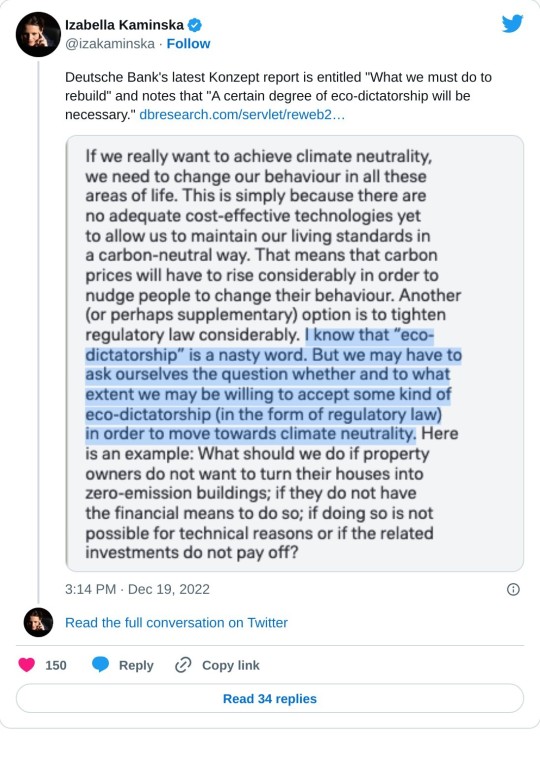
European polls show major divergence on labor issues, such as 52 percent of the working class rating fair working conditions as the most important to the EU’s social and economic development. Only 30 percent of the upper class feels the same way. And 66 percent of the EU working class feel their quality of life is getting worse; only 38 percent of the upper class feel the same way.
One need look no further for fragmentation between the WEF elite and working stiffs than Young Global Leader and French President Emmanuel Macron who is treated like royalty in Davos while back in France he’s faced nearly four years of gilets jaunes protests against his austerity and neoliberal policies, and some French can’t bear the sight of him:
youtube
And another:
youtube
They rolled out Henry Kissinger at Davos so he could tell the .001 percent they’ve been right all along about Ukraine, and they should now double down by rushing the country into NATO. The 99-year-old apparently wants to add to his 3-4 million body count before he kicks the bucket. As Spencer Ackerman writes:
The elite of the World Economic Forum consult one of the architects of today’s world to guide them out of the polycrisis he played a role in creating. And he inevitably reinforces the convictions of this same class, who most benefit from the way the world currently is, that they and they alone hold the keys to responsibly guiding the world out of the polycrisis. And if they further extract wealth from the wreckage of a polycrisis-wracked world, who’s to say there’s anything wrong with that? Certainly no one at Davos.
Even if these like-minded leaders lay waste to Europe, they probably think they can follow in the path of one of the WEF Young Leader trailblazers: former British Prime Minister and war criminal Tony Blair. After he left government he began “operating a dizzying, and often overlapping, web of charities, firms, and foundations that have catapulted him to the status of one of Britain’s wealthiest people.”
He travels around giving interviews warning against the dangers of populism and free public services – a task that is no doubt more difficult with Jeffrey Epstein’s “Lolita Express” no longer offering him free rides.
The problem is that before these people can cash in à la Blair, they just might get us all killed first. As Patrick Lawrence wrote at Consortium News after Angela Merkel’s (another WEF Global Leader for Tomorrow) revelations that the Minsk Accords were simply a ruse intended to buy time for Ukraine to prepare for war:
A measure of trust was essential between Washington and Moscow even during the Cold War’s most perilous passages. The Cuban Missile Crisis was resolved as it was because U.S. President John F. Kennedy and the Soviet premier, Nikita Khrushchev, were able sufficiently to trust one another. This trust no longer exists, as Putin and other Russian officials have made clear in responding to publication of the two German interviews.
Moscow and Beijing have said repeatedly since Joe Biden assumed office not quite two years ago that there is no trusting the Americans. The follow-on thought is that there is no point negotiating with them in a diplomatic context. For various Russian officials, from Putin on over and down, Merkel’s revelations seem grimly to have confirmed these conclusions.
It is a major turn that Moscow now includes the Europeans, and especially the Germans, in this assessment. Germany now tells the lies of which the American empire is made — a matter of anxiety and sadness all at once. If scorched-earth diplomacy is a fitting name for what the West has been up to in its dealings with Russia since 2014, as I think it is, the German bridge between West and East has been burnt.
The gravity of these conclusions, the implications as we face forward, are immense for the West and non–West alike. A world replete with hostilities is one we all know. A world devoid of trust and talking will prove another matter.
#world economic forum#davos#davos world economic forum#davos man#ukraine conflict#world war 3#WEF#Youtube
28 notes
·
View notes
Text
WOLFGANG STREECK-Il COLLASSO dell’IMPERO sarà la FINE del CAPITALISMO?
youtube
1 note
·
View note
Text
De la integración a la cooperación. Menos Europa para más Europa... La UE está siendo secuestrada por el proyecto neoliberal y hay que detenerla. Sin embargo, esto no significa que no pueda desempeñar un papel importante en Europa... la UE actual es demasiado heterogénea para que ningún país europeo, ni siquiera Luxemburgo, permita que su soberanía sea absorbida por un euroestado integrado; el ideal germano-europeo de un estado federal con una escalera de competencias incorporada es incompatible con la diversidad dramáticamente creciente de los estados de la UE... una entidad heterogénea como la UE es ingobernable desde arriba, como quedó demostrado cuando Merkel y Sarkozy rescataron a los bancos alemanes y franceses como solución a la crisis financiera, sin avanzar hacia una unión bancaria... la UE es incapaz de conciliar los intereses de sus Estados con la inmigración... ¿Por qué los Estados miembros, o sus clases políticas, se aferran a pesar de todo a la UE? Porque permite trasladar los problemas nacionales y la responsabilidad de tratarlos hacia arriba, al superestado europeo, al desplazamiento de la responsabilidad a un pseudogobierno central democráticamente inaccesible y tecnocráticamente incompetente... Es a este tipo de juegos a los que pondría fin un proyecto europeo renovado de forma realista... Para ello, sería esencial reconocer el papel central de los Estados nacionales, remediando el "déficit democrático" reforzando el papel europeo de los parlamentos de los estados miembros... en resumen, tomándose en serio el principio de subsidiariedad proclamado en los tratados de la UE y abandonar la ilusoria esperanza de una superpolítica integrada con supersoluciones uniformes en un superestado europeo ( Wolfgang Streeck)
0 notes
Text
"There were times in the postwar era when German governments sought to develop a national security policy of their own – like Willy Brandt’s détente, viewed with suspicion by Nixon and Kissinger; Schröder’s refusal, together with Chirac, to join the ‘Coalition of the Willing’ in its abortive search for weapons of mass destruction in Iraq; Merkel’s veto in 2008, alongside Sarkozy, of Ukraine’s admission to NATO; Merkel’s attempt with Hollande, culminating in the Minsk I and II agreements, to broker some sort of settlement between Russia and Ukraine; and Merkel’s stubborn refusal to take seriously the NATO target of a 2%-of-GDP defense budget. By 2022, however, the decline of the Social Democratic Party and the rise of the Greens had weakened German capacity and indeed desire for a modicum of strategic autonomy. This was evidenced two days into the war by Scholz’s Zeitenwende speech in the Bundestag, which if anything was a promise to the United States that insubordination of the Brandt, Schröder and Merkel sort would not happen again."
- Wolfgang Streeck
4 notes
·
View notes
Text
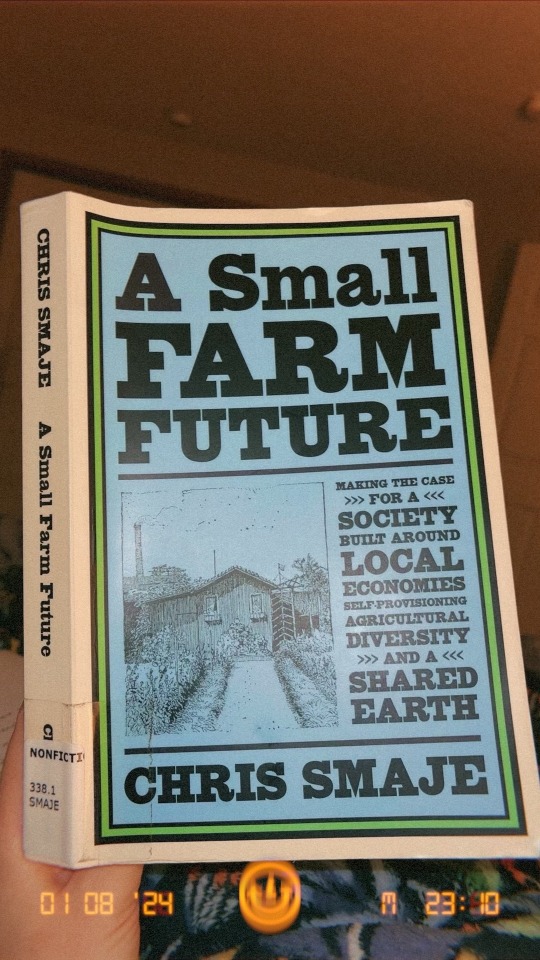
“Wolfgang Streeck argues that the combination of increasing inequality, debt and political stress with decreasing growth will probably end the era of capitalism - one that lasted longer than anyone could have expected on the basis of its strange socioeconomic ordering: an economy requiring limitless growth, and a society that, in his words: ‘secures its collective reproduction as an unintended side-effect of individually rational, competitive profit maximization’ that puts its productive capital into the hands of a minority, thereby largely abdicating political responsibility for human welfare. In Streeck’s view, capitalism probably won’t be replaced by some other functioning global order, but by macro-level disorder and indeterminacy. It’s a potentially frightening prospect, with numerous bad outcomes in the offing. But it does at least open up the tantalizing possibility of a political economy that doesn’t equate human development with economic growth, instead placing human health and well-being at the center of an economy not dependent on quantitative growth. I’d argue it’s time to make the most of that possibility and start building autonomies from capitalism again.”
0 notes
Text
„Die Linke war stets konservativ“Linksintellektueller Streeck verteidigt Wagenknecht
Die JF schreibt: »Die Linken-Politikerin Sahra Wagenknecht gründet eine eigene Partei. Dafür muß sie vor allem von einstigen Weggefährten viel Kritik einstecken. Unterstützung bekommt sie grundsätzlich vom renommierten Soziologen Wolfgang Streeck.
Dieser Beitrag „Die Linke war stets konservativ“Linksintellektueller Streeck verteidigt Wagenknecht wurde veröffentlich auf JUNGE FREIHEIT. http://dlvr.it/SxfsT6 «
0 notes
Text
youtube
Germany Is Rearming For US Empire | This Is Gonna Come Back To Hunt Us | Dr. Wolfgang Streeck
0 notes
Text
UE, proiect european sau organizație auxiliară a NATO?
UE, proiect european sau organizație auxiliară a NATO?
Când vine vorba despre politică, italienii cred în ”dietrismo”, în ce se întâmplă ”în spate”, împărțind lumea între scenă și culise, acolo unde are loc acțiunea care contează, scrie sociologul german Wolfgang Streeck. Când citește ceva sau aude ceva la radio la televizor, un „dietrista” experimentat nu își pune întrebări despre ce i se…
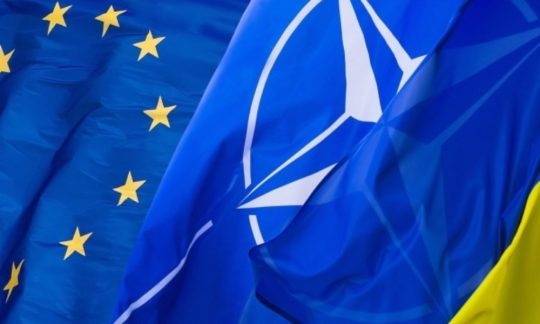
View On WordPress
0 notes
